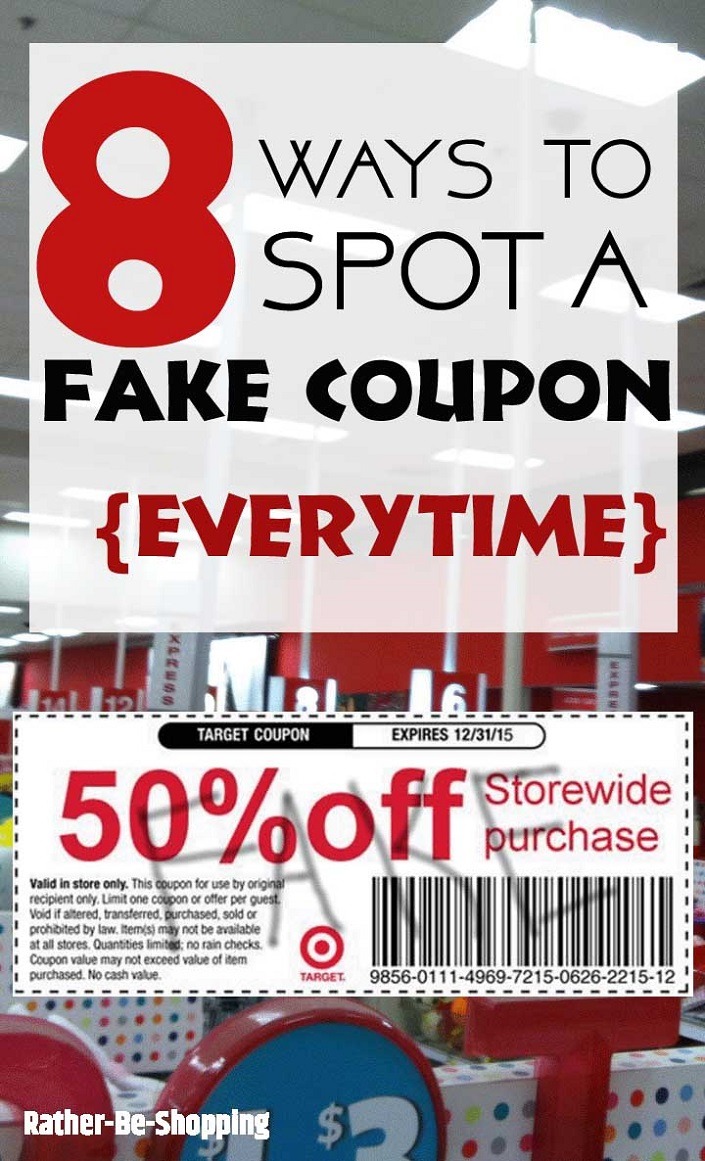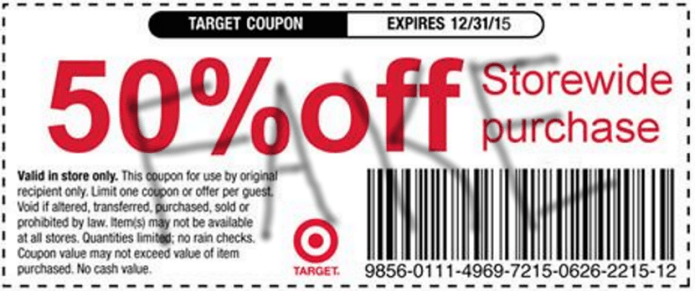All The Ways to Spot a Fake Coupon…Every Time
Have you ever found a coupon and thought to yourself, “Wow, this bad boy is going to save me a ton of money!” Perhaps it was the 50% off store-wide Target coupon that was floating around Facebook recently. Or maybe it was an online coupon code that promised something for free, or Oakley sunglasses for 90% off the retail price. I almost fell for the latter.
The truth of the matter is that fake coupons exist, always have, and probably always will. But if you’re an informed couponer, you can easily spot a fake coupon and avoid falling prey. Here are eight ways to identify a fake coupon…every time you shop.

1. It Doesn’t Link To the Retailer’s Website
If you see a killer coupon, like the Target 50% off above, and it doesn’t link directly to the Target website, or a legitimate coupon website, it’s almost surely fake.
In the case of this Target coupon, it was floating around Facebook and being shared liked crazy.
The link associated with the coupon pointed to a shady “survey” website that promised free products if you completed an online survey.
There was no mention of the 50% off coupon anywhere on their site and those who did print it and take into their local Target were quickly informed by store employees that it was indeed fake.
2. Coupon is Photocopied
Whenever you stumble upon a printable coupon that has clearly been photocopied, stay away as it won’t be honored by the store.
This falls back to the idea of making sure you get your printable in-store coupons from a valid source like Coupons.com or KrazyCouponLady.com.
You’ll often find photocopied coupons shared on shady online forums and discussion groups, so beware of those and always be skeptical if the coupon looks copied.
See Also: 8 Retailers That Let You Stack Coupons To Double Your Savings
3. It Flat-Out Looks Fake

Things to look for include a missing bar code, text font that doesn’t match the rest of the coupon, and a design that simply looks like it was homemade by an amateur Photoshop user.
98 times out of 100, the coupon is gonna be fake if you see any of these things.
4. It’s Blacklisted
Yes, there is actually a database of counterfeit coupons that consumers can access for free.
The list is created and kept updated by the Coupon Information Corporation and includes a ginormous list of fake coupons from manufacturers like Pepsi, Revlon, Proctor & Gamble, Kraft, Nestle, MillerCoors, and dozens more.
So if you find a coupon that looks a little suspect, come check out this online database and do a quick search to see if your suspicions are accurate.
See Also: Forgot Your Coupon? These Stores Will STILL Help You Save
5. Coupon Offer is Simply Too Good
Let’s be honest here, do you EVER think a store like Target or Kohl’s would release a 50% off coupon to the general public?
No, of course not.
Trust your gut when you stumble upon a coupon that looks too good to be true, because it probably is.
6. It Costs Money to Get
When it comes to paying money to save money it’s important to understand the risks.
Not only are many coupons that you have to pay for fake, but legit versions are often found online for free.
Paying for coupons on eBay is the biggest culprit.
While there are many legit coupon sellers on eBay, there are also a few bad apples that will happily rip you off.
Pay attention to the sellers feedback rating to determine their legitimacy and avoid coupons that appear too good to be true.
For example, coupons being sold on eBay which are good for a “high dollar amount” off your entire purchase are often fishy.
I recently found a couple bogus coupons on eBay for $50 off your entire purchase at Lands’ End and $45 off your Sports Authority purchase.
I knew that both retailers never have coupons this good, so I knew to avoid them.
7. There’s No Expiration Date (or 11/31)
I recently found a fake American Eagle coupon that had an expiration date of 11/31/22 and it made me laugh.
I guess counterfeiters are going after people who aren’t incredibly familiar with the Gregorian calendar or simply don’t look at it very closely.
Also, if a printable in-store coupon has no expiration date on it, you’d be wise to tread lightly as it stands a great chance of being fake.
See Also: 17 Stores That Let You Return Used Items for a Full Refund
8. The Coupon Promises a Free Product
If the coupon promises to give you a free product after you register with the website offering the coupon, you should run the other way quickly.
These types of coupon offers have been floating around Facebook and Twitter a lot recently and you need to be aware of the risks.
Often times it works like this:
1. Click on the coupon offer on Facebook, and get redirected to a website you’ve never heard of.
2. Register with the website, including your credit card information, in order to get the “free” product.
3. Get promised the free product in a couple weeks.
4. Product never arrives and now they’ve got your credit card number. Avoid these fake coupons like the plague.
Very little in life is free and the risks are not worth the possible headaches.
Ask the Reader: Have you ever tried to use a fake coupon and were denied? If so, which one of the above fake coupon categories did it fall into?

By Kyle James
I started Rather-Be-Shopping.com in 2000 and have become a consumer expert and advocate writing about out-of-the-box ways to save at stores like Amazon, Walmart, Target and Costco to name a few. I’ve been featured on FOX News, Good Morning America, and the NY Times talking about my savings tips. (Learn more)


Like everyone else, I too often shop for coupons on the internet but off late, I have found out that it is more of a hassle than a promise to save money. In short, I learned over time that the best thing to do would be to check the website where the source of the coupon is reputed to come from, to see if it is worth my while to consider at after all. Most often, it is not. There are tons of fake coupons out there in the marketplace waiting to nab the unwary customer. As stated, some of them simply lead you on to purchase something else. This article is an excellent roundup that surmises just what we should do when an internet coupon comes our way. Thanks for sharing!
That was exactly my question, didn’t notice your question there.
Applying common sense to online couponing is apparently harder than it seems at first glance, but the temptation of getting 50% off everything you buy at Target, Kroger, or whichever fake coupon is circulating this week is simply too great. Before you click, though, ask yourself whether the coupon you’re looking at is an actual thing that a business that wants to make a profit would put online. For most fake coupons we’ve seen, the answer would usually be “no.”
There is a lot of info in this article but I wonder if there is a way to spot the fake “online coupons”. Most of the website offering those have some sort of affiliation with the merchant and the coupons end of either not working or sampling getting a lot of spammy pop-ups on the screen.
Applying common sense to online couponing is apparently harder than it seems at first glance, but the temptation of getting 50% off everything you buy at Target, Kroger, or whichever fake coupon is circulating this week is simply too great. Before you click, though, ask yourself whether the coupon you’re looking at is an actual thing that a business that wants to make a profit would put online. For most fake coupons we’ve seen, the answer would usually be “no.” and thanks.
Excellent work….truely appreciated
Hello
What if the coupon has a bar code but no numbers next to it? Is it a real coupon?